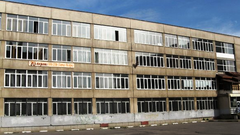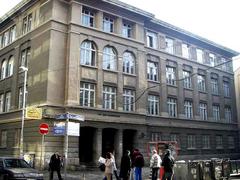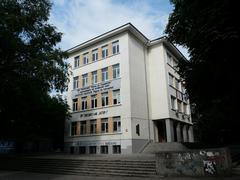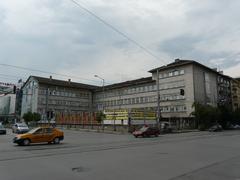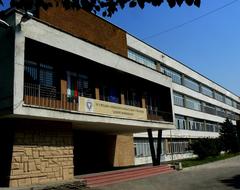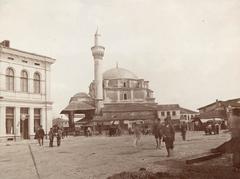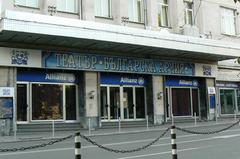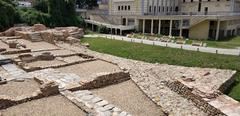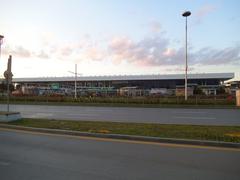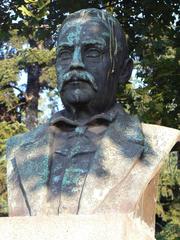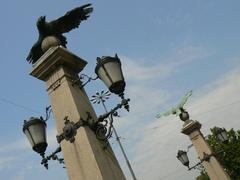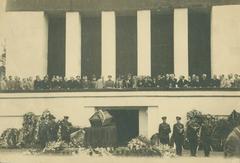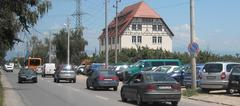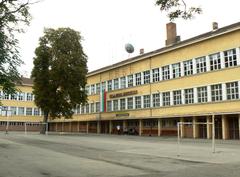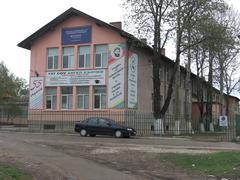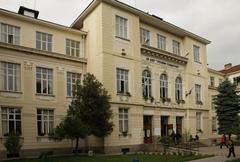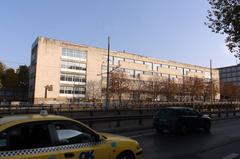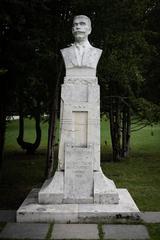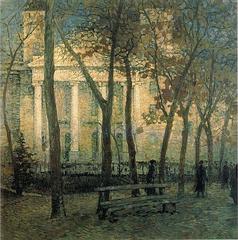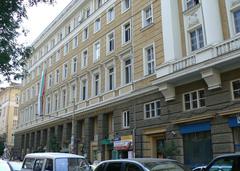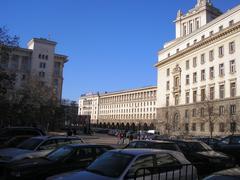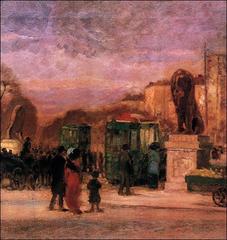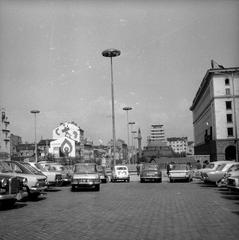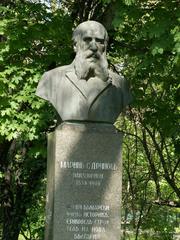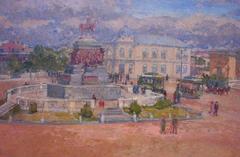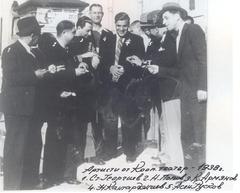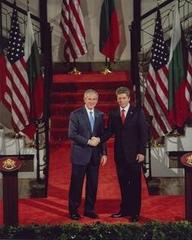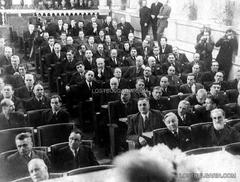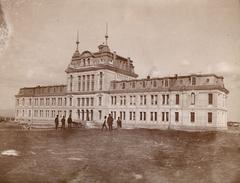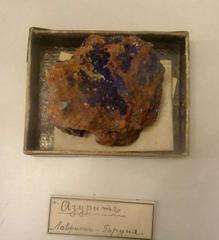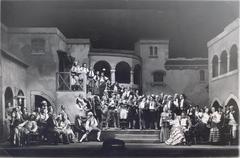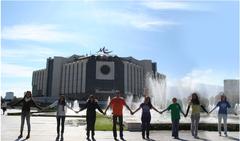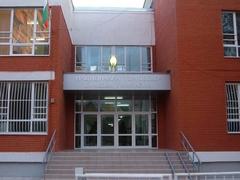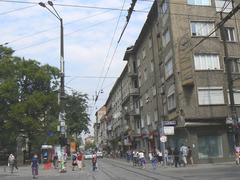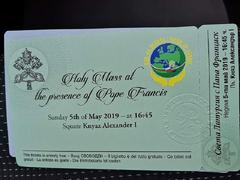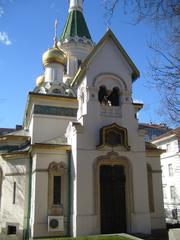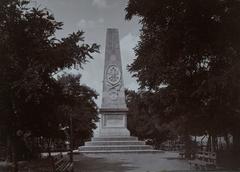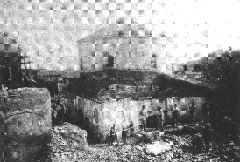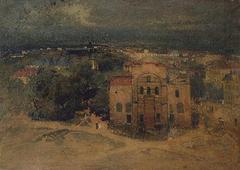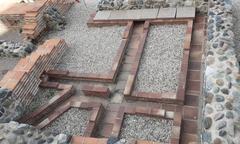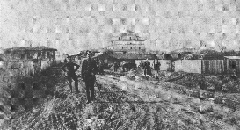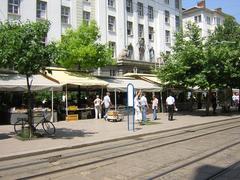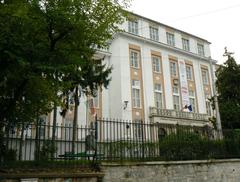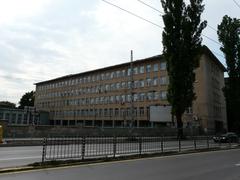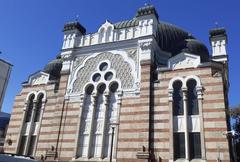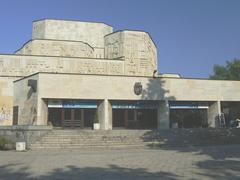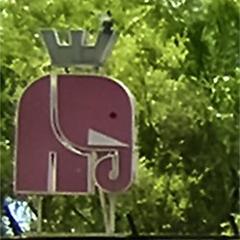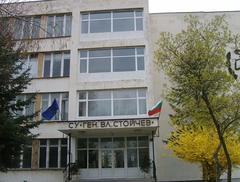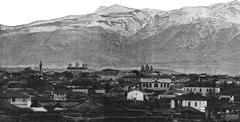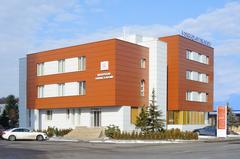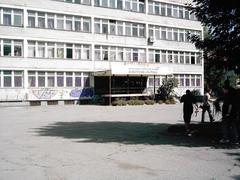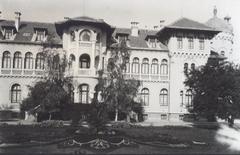
Embassy of Germany Sofia, Bulgaria: Visiting Hours, Tickets, and Comprehensive Visitor Guide
Date: 04/07/2025
Introduction
Located in the heart of Sofia, the Embassy of Germany is a pivotal institution that reflects the enduring diplomatic, cultural, and historical relationship between Germany and Bulgaria. Established in the early 20th century, the embassy has played a crucial role in shaping bilateral ties, supporting German nationals, and promoting cultural exchange. This guide offers detailed information about the embassy’s history, visiting hours, appointment systems, consular services, and essential etiquette to ensure a smooth and respectful visit (History of Sofia; Room for Diplomacy; German Embassy Sofia; Stylat10).
Whether you are seeking consular assistance, attending a cultural event, or simply wish to learn more about German-Bulgarian relations, this comprehensive resource will help you plan your visit and appreciate the legacy and modern significance of the German Embassy in Sofia.
Table of Contents
- Introduction
- Historical Background
- Visitor Information
- Embassy’s Role in Bilateral Relations
- Architectural and Cultural Legacy
- Nearby Attractions
- Frequently Asked Questions (FAQ)
- Summary and Recommendations
- References
Historical Background
Early Origins of the German Diplomatic Mission
The German diplomatic presence in Sofia began in the late 19th and early 20th centuries, paralleling Bulgaria’s emergence as an autonomous state after liberation from Ottoman rule (History of Sofia). As Sofia became the nation’s capital, Germany was among the first countries to establish formal diplomatic relations, signifying its commitment to fostering political, economic, and cultural collaboration with Bulgaria (Room for Diplomacy).
Acquisition and Development of the Embassy Site
In 1907, Bulgaria offered a prestigious plot on then Boulevard Tolbukhin (now Boulevard Vasil Levski) for the construction of British and German embassies. The location was emblematic of Sofia’s ambition to become a cosmopolitan European capital (Room for Diplomacy). The official act of possession was signed in 1910, granting each country a portion of the land and reinforcing Bulgaria’s intent to cultivate strong ties with leading European powers.
Architectural Significance
The German embassy’s architecture reflects Sofia’s rich diplomatic quarter, characterized by early 20th-century styles such as Neo-Renaissance and Neo-Baroque. While specific details of the original architect are limited, the building’s design contributes to Sofia’s diverse architectural landscape, symbolizing both German prestige and the city’s cosmopolitan growth (BNR: Sofia’s architectural masterpieces).
20th Century Evolution
The embassy’s history has been shaped by global events including both World Wars, the Cold War, and the division and reunification of Germany. Throughout these periods, the embassy adapted to changing political climates, at times suspending operations or relocating, especially during periods of conflict or regime change (BNR: Sofia’s architectural masterpieces).
Post-Communist Restitution and Modernization
Following the fall of communism, property restitution and increased consular demands led to modernization. By 2001, the embassy’s offices, including consular and visa sections, were relocated to modern facilities at 9 Moscovska Street to better serve the needs of both German and Bulgarian citizens (Room for Diplomacy).
Visitor Information
Visiting Hours
- Consular Services: Monday to Friday, typically 9:00 AM–12:00 PM.
- Visa and Passport Services: Appointments are mandatory for all consular matters.
- Closures: The embassy observes both German and Bulgarian public holidays. Always check the official website for the latest updates.
Tickets and Entry
- Entry: No tickets are required; access is by appointment only.
- Identification: Bring a valid photo ID and your appointment confirmation.
- Security: Expect airport-style screening; large bags and photography are prohibited.
Accessibility
- The embassy is wheelchair accessible and has facilities for visitors with disabilities. If you require special assistance, notify the embassy when booking your appointment.
How to Get There
- Address: ul. Frédéric Joliot-Curie 25, 1113 Sofia, Bulgaria
- Public Transport: Accessible via F. J. Curie Metro Station, trams, and buses. Taxis and ride-hailing services are also convenient.
- Parking: Limited; using public transport is advised.
Security and Etiquette
- Arrival: Arrive 10–15 minutes early for your appointment.
- Dress Code: Business or smart casual attire is recommended.
- Conduct: Greet staff formally, use professional titles, and address embassy personnel with respect (Stylat10; Deutschland.de).
- Language: Staff speak German, English, and Bulgarian. Using basic German greetings (“Guten Tag”, “Auf Wiedersehen”) is appreciated.
Embassy’s Role in Bilateral Relations
The German Embassy in Sofia is the main hub for diplomatic engagement, economic cooperation, and cultural exchange between Germany and Bulgaria. The embassy manages a broad portfolio, from visa and passport services to educational, scientific, and artistic initiatives (German Embassy Sofia). Consulates in Plovdiv and Varna further extend Germany’s reach and support within Bulgaria.
Architectural and Cultural Legacy
The embassy’s buildings have left a lasting mark on Sofia’s urban landscape, blending German architectural traditions with the city’s cosmopolitan development. The area around Boulevard Vasil Levski remains a prominent diplomatic quarter, reflecting the international spirit of Bulgaria’s capital (BNR: Sofia’s architectural masterpieces).
Nearby Attractions
Enhance your visit by exploring some of Sofia’s most celebrated sites, all within walking distance of the embassy:
- Alexander Nevsky Cathedral
- Ivan Vazov National Theatre
- National Library
- National Art Gallery
- Vitosha Boulevard for shopping and dining
For more travel inspiration, consult Visit Sofia Tourism Information.
Frequently Asked Questions (FAQ)
Q: What are the embassy’s visiting hours?
A: Monday to Friday, 9:00–12:00 for consular services. Check the official website for updates.
Q: Is an appointment required?
A: Yes, all consular services require an online appointment.
Q: Do I need a ticket for entry?
A: No, entry is by appointment only and free of charge.
Q: What documents should I bring?
A: Bring your appointment confirmation and a valid photo ID. Additional documents may be required for specific services.
Q: Is the embassy wheelchair accessible?
A: Yes.
Q: Can I take photos inside?
A: Photography is not permitted inside the embassy.
Q: How do I pay consular fees?
A: Payments must be made in cash and Bulgarian leva; cards are not accepted (German Embassy Sofia Consular Services Guide).
Q: When will ETIAS become mandatory?
A: ETIAS will be required for visa-exempt travelers from mid-2025 (Consular Services Portal).
Summary and Recommendations
The Embassy of Germany in Sofia stands as a symbol of enduring partnership and cooperation between Germany and Bulgaria, offering a comprehensive range of consular services, cultural programs, and support for travelers and residents. Efficient online appointment systems, digitalized visa applications, and clear visitor protocols ensure a smooth experience. Understanding and respecting German cultural etiquette—such as punctuality and formal greetings—will further enhance your visit (Deutschland.de).
For the most current information, always refer to the official embassy website. Planning ahead, bringing the required documentation, and allowing time to explore nearby Sofia attractions will make your embassy visit both productive and memorable.
References
- History of Sofia
- Room for Diplomacy: Bulgaria Sofia
- BNR: Sofia’s architectural masterpieces with a diplomatic mission
- German Embassy Sofia Official Website
- German Embassy Sofia Consular Services Guide
- German Cultural Etiquette: What Visitors Should Know
- A Guide to German Etiquette
- Visit Sofia Tourism Information
- Consular Services Portal




